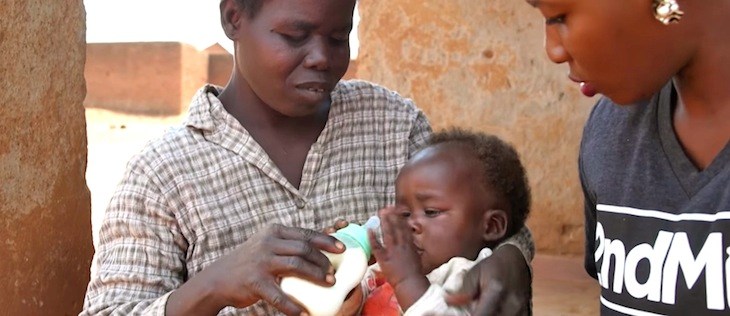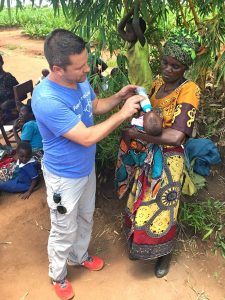2nd Milk mission seeks to reduce poverty in Malawi for next generation
by May 16, 2018 11:45 am 2,282 views

More than 400 orphan babies in sub-saharan Africa are kept alive from formula provided by 2nd Milk, a local nonprofit founded by Jason and Lacey Carney of Springdale.
It’s more than 9,000 miles from Northwest Arkansas to Malawi, Africa, but Jason and Lacey Carney of Springdale see the poorest nation in the world as a land of opportunity.
Jason Carney moved his family of eight to Malawi in 2013 to run a small orphanage and the experience changed his life. Carney, who recently spoke at the Trade with Africa Business Summit held in Bentonville, said he’s drawn to help Africa break the cycle of poverty in the next generation.
“I worked in sales for J.B. Hunt, Lacey was one of the founders of Bliss Cupcakes and we owned three cupcake stores here, but we quit our jobs and sold the business and made the trek to Malawi not really knowing what to expect,” he said. “What we found were the poorest people on earth with more hope in their hearts than just about anyone we knew in the states.”
It quickly became evident to Carney infant mortality was closely tied to nutrition. If the baby’s mom was able to breastfeed, the baby had a chance to survive. But if the baby was orphaned, families often had to let the infant die. He said complications from HIV/AIDS still takes many young lives creating a host of orphans who are then destined to repeat the cycle.
Infrastructure is also a problem. There was a five-week period the orphanage was without electricity. There was no running water their first four months at the orphanage. He said the first month on the ground the family had to learn how to survive in the primitive environment and it wasn’t until the second month they discovered a grocery store three hours away. He said to get grocery supplies it was a six-hour trip at $8 per gallon for fuel.
“We worked to try and understand the culture and saw a need not being met for the most vulnerable – infants,” Carney said. “With Malawi being the poorest nation in the world for four consecutive years there are dozens of non-governmental organizations on the ground there but none of them including World Health Organization … provide formula to babies. When I asked them why not, I was told it was too expensive and too hard.”
By early 2015, Carney said the orphanage was directly supporting 80 kids and 70 widows and feeding 1,000 kids a day in the community, six days a week. He and his family returned to the U.S. and launched a nonprofit organization called 2nd Milk aimed at providing powered baby formula to families trying to raise infants without mothers. He said the family poured their entire savings into the charity and agreed to take no personal salary.
2ND MILK
Carney said there are about 400 babies who have benefited from the 2nd Milk program. The majority are located in Malawi but there are also smaller operations in Kenya, Uganda and Ghana. In February, 2nd Milk crossed the one-million bottle threshold for giving in just three years.

“We have sponsors who support the purchase of baby formula to age 18 months old and then shelf-stable milk packets and cereal to age 5 for one child,” he said. “Our staff of 30 in Africa runs the operations on behalf of 2nd Milk. We purchase the powered formula locally and hold training sessions with families to ensure they know how to sterilize bottles and water for mixing.”
Carney said 2nd Milk has not been able to leverage the local supplier community to source formula products. Purchasing the formula locally was intended to help bolster the small African economies but Carney said retail centers are mostly owned and operated by foreign nationals and he’s not sure the money is staying local. He’s interested in pursuing sourcing opportunities with the likes of Nestle, Abbott Labs and Gerber that each are major formula makers in the U.S. He said 2nd Milk is not asking for free formula, but if he could buy it in bulk there could be cost savings.
“I an running this nonprofit like a business so that it can become sustainable over time and raise a generation out of poverty with better education and economic opportunities tied to farming,” he said. “Our goal is to get 2nd Milk to a sustainable level financially by year five.”
EXPANSION OF SUPPORT
Carney said 2nd Milk feeds orphaned children to age 5 and wants to provide private education through grade 8. To fund the effort, the charity is in the process of building small chicken houses which are financed through micro-loans He said families raising the orphaned babies will own the farms equipped with laying hens and eventually broiler chickens. The funds generated from the farming helps improve their economic condition in a country with per capita income of about $300 per year for a family of eight.
2nd Milk employees in Africa distribute the formula and milk and conduct training sessions with families on how to mix the formula and sanitize bottles to U.S. standards. In addition to overseeing 2nd Milk, Carney is vice president of global travel for Blue Sun Vacations in Fayetteville, where he takes groups to various places in Africa.
“I have a family to support and I do that through my work with ( Fayetteville company) Blue Sun Vacations,” Carney said. “I am going to Africa this Friday (May 18) for two weeks taking a group to South Africa and Uganda. I will be back for nine days before I will make another two-week trip to Malawi and during that time I will be working on the expansion of the small chicken house program.”
Carney also said he would like expand operations in Kenya, Uganda and Ghana where he’s set up a base operation and has local leaders in place.
He said long-term, around 20 years, the payoff of 2nd Milk should be an educated class of young adults who create change in their homelands and increase economic opportunity. When asked if there were other connections and support for 2nd Milk, he said access to a shipping container would be a huge help to transport formula and milk into Africa from the U.S. or Europe.
